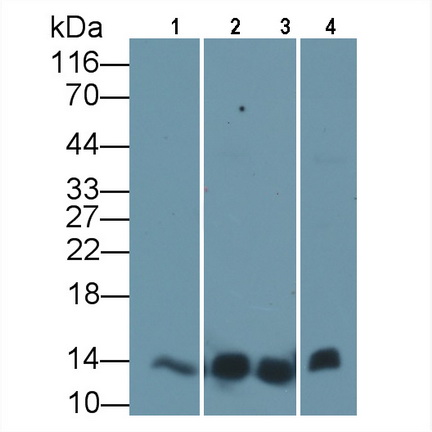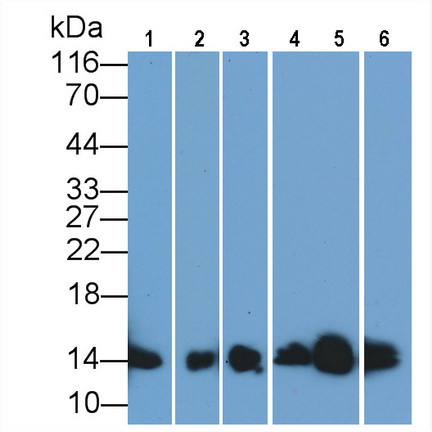Anti-Cytochrome C (CYCS) Monoclonal Antibody 

Cyt-C; HCS; CYC; CytC
Overview
Properties
- Product No.CAA594Mi22
- Organism SpeciesHomo sapiens (Human), Mus musculus (Mouse), Rattus norvegicus (Rat), Sus scrofa; Porcine (Pig) Same name, Different species.
- ApplicationsWB
Research use only - Downloadn/a
- CategoryMetabolic pathwayDevelopmental science
- PurificationProtein A + Protein G affinity chromatography
- LabelNone
- Buffer FormulationPBS, pH7.4, containing 0.02% NaN3, 50% glycerol.
- TraitsLiquid, Concentration 1mg/mL
Sign into your account
Share a new citation as an author
Upload your experimental result
Review

Contact us
Please fill in the blank.
Specifity
The antibody is a mouse monoclonal antibody raised against CYCS. It has been selected for its ability to recognize CYCS in immunohistochemical staining and western blotting.
Usage
Western blotting: 0.01-2µg/mL;
Optimal working dilutions must be determined by end user.
Storage
Store at 4°C for frequent use. Stored at -20°C in a manual defrost freezer for two year without detectable loss of activity. Avoid repeated freeze-thaw cycles.
Stability
The thermal stability is described by the loss rate. The loss rate was determined by accelerated thermal degradation test, that is, incubate the protein at 37°C for 48h, and no obvious degradation and precipitation were observed. The loss rate is less than 5% within the expiration date under appropriate storage condition.
Organism Species More: Homo sapiens (Human), Mus musculus (Mouse), Rattus norvegicus (Rat), Cavia (Guinea pig ), Hamster (Chinese hamster), Oryctolagus cuniculus (Rabbit), Canis familiaris; Canine (Dog), Sus scrofa; Porcine (Pig), Capra hircus; Caprine (Goat), Ovis aries; Ovine (Sheep), Chicken (Gallus)Giveaways
Increment services
-
 Antibody Labeling Customized Service
Antibody Labeling Customized Service
-
 Protein A/G Purification Column
Protein A/G Purification Column
-
 Staining Solution for Cells and Tissue
Staining Solution for Cells and Tissue
-
 Positive Control for Antibody
Positive Control for Antibody
-
 Tissue/Sections Customized Service
Tissue/Sections Customized Service
-
 Phosphorylated Antibody Customized Service
Phosphorylated Antibody Customized Service
-
 Western Blot (WB) Experiment Service
Western Blot (WB) Experiment Service
-
 Immunohistochemistry (IHC) Experiment Service
Immunohistochemistry (IHC) Experiment Service
-
 Immunocytochemistry (ICC) Experiment Service
Immunocytochemistry (ICC) Experiment Service
-
 Flow Cytometry (FCM) Experiment Service
Flow Cytometry (FCM) Experiment Service
-
 Immunoprecipitation (IP) Experiment Service
Immunoprecipitation (IP) Experiment Service
-
 Immunofluorescence (IF) Experiment Service
Immunofluorescence (IF) Experiment Service
-
 Buffer
Buffer
-
 DAB Chromogen Kit
DAB Chromogen Kit
-
 SABC Kit
SABC Kit
-
 Long-arm Biotin Labeling Kit
Long-arm Biotin Labeling Kit
-
 Real Time PCR Experimental Service
Real Time PCR Experimental Service
Citations
- Danhong injection protects cardiomyocytes against hypoxia/reoxygenation- and H2O2-induced injury by inhibiting mitochondrial permeability transition pore openingPubMed: 26320687
- Gypenosides alleviate myocardial ischemia-reperfusion injury via attenuation of oxidative stress and preservation of mitochondrial function in rat heartPubmed:26800973
- Clematichinenoside (AR) Attenuates Hypoxia/Reoxygenation-Induced H9c2 Cardiomyocyte Apoptosis via a Mitochondria-Mediated Signaling PathwayPubmed:27248986
- A polysaccharide (PNPA) from Pleurotus nebrodensis ameliorates hepatic ischemic/reperfusion (I/R) injury in ratspubmed:28709897
- Plasma Cellular Hypoxia, Mitochondrial Dysfunction, Disease Risk and Prognostic Factors in Type 2 Diabetic Patients in Saudi Arabia.
- Taxifolin protects rat against myocardial ischemia/reperfusion injury by modulating the mitochondrial apoptosis pathwayPubmed: 30723634
- High Concentrations of Boric Acid Trigger Concentration-Dependent Oxidative Stress, Apoptotic Pathways and Morphological Alterations in DU-145 Human Prostate …Pubmed: 31066018
- The Role of Oxidative Stress, Renal Inflammation, and Apoptosis in Post Ischemic Reperfusion Injury of Kidney Tissue: the Protective Effect of Dose-Dependent Boric …
- Betaine suppresses cell proliferation by increasing oxidative stress–mediated apoptosis and inflammation in DU-145 human prostate cancer cell linePubmed: 31368044
- Concentration-Dependent Effects of Zinc Sulfate on DU-145 Human Prostate Cancer Cell Line: Oxidative, Apoptotic, Inflammatory, and Morphological AnalyzesPubmed: 31463762
- Curcumin and LOXblock-1 ameliorate ischemia-reperfusion induced inflammation and acute kidney injury by suppressing the semaphorin-plexin pathway.Pubmed: 32603817
- Concanavalin A induces apoptosis in a dose©\dependent manner by modulating thiol/disulfide homeostasis in C6 glioblastoma cells33604990
- Reproductive Effects of Nicotinamide on Testicular Function and Structure in Old Male Rats: Oxidative, Apoptotic, Hormonal, and Morphological Analyses34101148
- Comparative effects of metformin and Cistus laurifolius L. extract in streptozotocin-induced diabetic rat model: oxidative, inflammatory, apoptotic, and histopathological?¡34097215
- Allicin ameliorates renal ischemia/reperfusion injury via inhibition of oxidative stress and inflammation in rats34426252
- 12/15–Lipoxygenase debilitates mitochondrial health in intermittent hypobaric hypoxia induced neuronal damage: An in vivo studyPubmed:34979449
- In Vivo and In Vitro Enhanced Tumoricidal Effects of Metformin, Active Vitamin D3, and 5-Fluorouracil Triple Therapy against Colon Cancer by Modulating the …Pubmed:35326689
- Proteomic analysis reveals USP7 as a novel regulator of palmitic acid-induced hepatocellular carcinoma cell deathPubmed:35732625
- Microbial hydrogen “manufactory” for enhanced gas therapy and self-activated immunotherapy via reduced immune escapePubmed:35705974
- Oksidatif, Apoptotik ve İnflamatuar Sinyal Yolakları üzerinden C6 Glioblastoma Hücrelerindeki ML351'in Antiproliferatif Etkileri
- Metformin and Calcitriol Enhance 5-Fluorouracil Tumoricidal Effects in Colon Cancer By Modulating The PI3K/Akt/PTEN/mTOR Network







